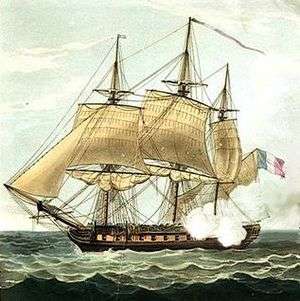French frigate Rubis (1812)
 Clorinde, sister-ship of the French frigate Rubis (1812) | |
| History | |
|---|---|
| Name: | Rubis |
| Namesake: | Ruby |
| Builder: | Nantes |
| Launched: | 1811 |
| Fate: | Burnt |
| General characteristics | |
| Class & type: | Pallas-class frigate |
| Displacement: | 1080 tonnes |
| Length: | 46.93 metres (154.0 ft) |
| Beam: | 11.91 metres (39.1 ft) |
| Draught: | 5.9 metres (19 ft) |
| Propulsion: | 1950 m² of Sail |
| Complement: | 326 |
| Armament: |
|
| Armour: | Timber |
The Rubis was a 40-gun Pallas-class frigate of the French Navy.
On 25 November 1812, under Commander Louis-François Ollivier, Rubis sailed from Nantes along with Aréthuse (Captain Pierre Bouvet) to intercept British trade off West Africa. In January, having captured a Portuguese ship, La Serra, they reached Cap-Vert.[1]
On 27 January 1813, Aréthuse intercepted the brig HMS Daring (Lieutenant Pascoe) off Tamara. Released prisoners reported the presence of the French frigates, prompting the departure of HMS Amelia (Captain Frederick Paul Irby).
In the night of 5 February, a storm hit Rubis and Aréthuse while at anchor; both frigates broke their cables and Rubis was thrown ashore, whole Aréthuse managed to sail clear of the coast into open water. Efforts to refloat her the next day proved futile, and she was abandoned by her crew, who embarked on the prize Serra, and scuttled by fire. Aréthuse fought the Action of 7 February 1813 with HMS Amelia the next day, and after the stalemate with her opponent, returned on the site of the wreck to rapatriate the crew to France.[2]
References
- ↑ William James, The Naval History of Great Britain from the declaration of war by France in February 1793 to the accession of George IV in January 1820 : with an account of the origin and progressive increase of the British Navy (New edition in Six volumes), Volume VI, pp183-190, R Bentley, London, 1837.
- ↑ Les bâtiments ayant porté le nom de Rubis